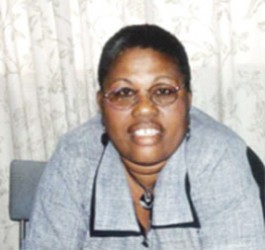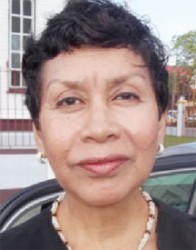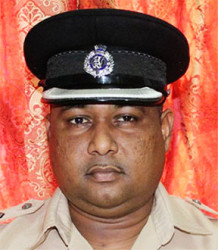The impregnating of an 11-year-old in the North West allegedly by a man who had raped her mother around the same time causing her death, has called into question the level of policing and social services in this region.
Five months later, the man who should be facing two charges: murder and carnal knowledge has not been apprehended by police and the Social Protection Ministry will also face questions given that it had pledged to address the serious societal ills in the region.
With four publicized cases of underage pregnancy from that region since the start of the year, Director of the Child Care and Protection Agency (CC&PA) Ann Greene says that a holistic approach involving all stakeholders is what is needed to properly address the problem which is spread across the country.

Greene while homing in on the need for a robust education campaign notes too that people need to understand that underage pregnancy should never be viewed as “culture” but rather an unlawful act.
Guyana has the second highest rate of adolescent pregnancy in the Western hemisphere and it has been said that 97 out of every 1,000 girls between the ages of 15 and 19 give birth annually. However in recent years it has been found that girls as young as 11 are giving birth.
In Region One, of the four cases found there recently, two of the girls are age 11. A recent Survey of Adolescent and Youth Sexual Trends in Guyana conducted by the Guyana Responsible Parenthood Association (GRPA) found that a “disproportionate number of rapes” are occurring in this region.
The publicizing of these recent cases has reopened the public debate on the issue and there are concerns that the relevant authorities are not doing enough.
“This whole question about dealing with the abuse of children has to be done holistically. It involves all stakeholders. It is not just the Child Care Agency. The Child Care Agency cannot work alone”, Greene told Stabroek News in a recent interview.
For Greene things have reached the stage where all stakeholders have to sit down and come up with a plan to address the issue. “Because yes, from what we are seeing and from our reports, the reports of teenage pregnancy are on the increase”, she said, while emphasising that her agency is very concerned.
“So if we have children at 15 and 14 and 13 being pregnant it means that they are being violated. It is a crime that is being committed…every time a child of that age turns up pregnant we have to find the perpetrators because we have a law that says that that is an offence ”, she said.
“There is so many areas so it means that we now have to collectively educate and in some instances re-educate so that people can really understand …so that is what we are going after this year is heightened awareness”, she said, going on to observe that caring for children is the responsibility of every adult and citizen.” She said that it is not only members of the community who have to come onboard but also the religious groups.
She stressed that the aim is to stop it from occurring and in this regard for 2016, her agency will be focusing on being proactive rather than reactive. The agency too, she said is working under the guidance of the new minister to put an end to child abuse in all its forms. She noted that the efforts have to be continuous until “we get it right”.
Expanding on her position of a collective effort, she issued a call for there to be more sex education sessions in schools. “We are going to allow our children to grow. We will allow our children to survive. We are going to allow them to blossom. We are not going to encourage them being deflowered”, she commented.
Law verses culture
Greene made it clear that the law of the land is not for one set of people but for all children. She pointed to one of the challenges faced in tackling underage pregnancy as being bridging the gap between law and culture.
“I am not saying that early pregnancy is any culture. It is not culture but there is some practices like in some groups there is some high tolerance level for early sexual activity…so we have to seriously look at bridging these gaps and looks to see these laws are really for all children…so we are addressing it holistically”, she reiterated.
She said one of the approaches to tackling this scourge would be education and re-education. She posited that there is need for this two-part approach so that people can understand what early sexual activity is and that getting a child in childhood is very dangerous particularly health wise. She noted that it is not only the child’s life that is affected but that such a situation also has effects on the country, something which people do not understand.

The majority of cases of underage pregnancy that have been highlighted come from the interior regions. Asked if efforts will be made to reach out to Toshaos and village councillors, she replied in the affirmative, adding that the Ministry of Social Protection has already taken steps in this regard.
She said that persons should not be fooled into believing that underage pregnancy is occurring only in one particular region of the country. She reiterated that it is spread all across the country. Greene said that the majority of the population resides in Region Four and when her agency looks at the data the abuse is occurring more in this region. The media has been playing a part in publicizing cases.
`Speedy action’
On the issue of perpetrators not being caught, Greene said that she is very concerned about that. “That’s what is killing me because we have been responding. It is the system, the whole justice system…I am not knocking anyone because we have to all come together and sit down because we all in this”, she stated.
Greene told this newspaper that there needs to be more “speedy action” when underage pregnancy cases are detected. She said that the 72 hours the law permits the police to hold a suspect without charge gives her “nightmares”. In almost every case, she explained, the police are unable to wrap up their investigation within that period and as such are forced to release the suspect on bail pending the completion of the investigation. She indicated she was speaking from first-hand experience.
“For me you can bring your case in 72 hours if we have a quick response we could bring this case in 72 hours”, she emphasized. She said that justice delayed is justice denied. “We have to get speedier; perhaps we need the quick response group”, she said.
As part of the plan for this year, officers will be sent to various communities in the region so that the agency’s work can be decentralized.
Doubling of efforts

Minister within the Ministry of Indigenous Peoples’ Affairs, Valerie Garrido-Lowe says that she too is concerned about incidents of underage pregnancies in indigenous communities. In this regard she said the ministry’s welfare department is looking to increase its efforts and strengthen it collaborative efforts with the Ministry of Social Protection.
She revealed that underage girls and teens are brought out from the hinterland communities often to seek medical attention because of their ages or complications. They would be housed at the Amerindian Hostel.
For last year she said in the 13-16 age category, the hostel’s records show eleven girls from Region One; eleven from Region Seven; three from Region Eight and one from Region Nine stayed there. For this year so far, two are from Region One; one from Region Eight and three from Region Nine. The figures for this year do not include the girls who are currently hospitalized as a result of their condition.
Garrido-Lowe said that subsequent to the change in government, the ministry developed a programme in collaboration with the Ministry of Social Protection which focused on issues such as teenage pregnancy, incest, alcohol and drug abuse, domestic violence and labour matters. The programme kicked off in Kato in November last year.
The plan according to her will be to have teams visiting the various interior regions to get a first-hand look at what is happening on the ground and also train more persons so that a welfare officer can be placed in each indigenous village.
For the minister the root cause of the sexual abuse needs to be explored. For this year, she said the ministry is attempting to embark on a collaborative effort with UNICEF to have a situation analysis done on indigenous women and children. She expressed the belief that once this is done, a lot of light will be shed on teenage pregnancy and other issues.
Engaging parents and the community about the laws particularly those pertaining to sexual offences has already started and will continue.
“Of course it is distasteful. It’s unfortunate. It’s troubling and it is something that I mean to get rid of. I am making that commitment to work hard”, she emphasized, while adding that she is not looking at reducing it but rather putting an end to it. This, she said, can be done through education and empowerment.
11 and pregnant
An 11-year-old was one of two girls who were the first to be rescued. She is said to be five months pregnant.
It has been reported that her father who is responsible for her condition had allegedly raped her mother who had undergone a Caesarian Section (CS) procedure resulting in her bleeding to death. This was confirmed by Greene.
Greene said though that newspaper reports stating the child became pregnant after she was removed from her home to that of a relative are inaccurate. She explained that when the child was removed from her home following her mother’s death, she was already pregnant. “She went to the relative but she was already pregnant…This is October this thing [the rape of the mother] happened so it would have meant when we placed her with the relative she was pregnant”.
She noted that in the majority of the cases girls would hardly give enough information to identify the perpetrators; this she said is a major challenge with these types of investigation.
Greene said too that initially it was unknown that the father of the child was responsible for her condition. “There was no talk that she was even being interfered with”, she said, adding that eventually things came out.
Greene said that after the mother’s death the police became involved and they are hunting for the man. She confirmed too that there was a report that the perpetrator has disappeared with a ten-year-old.
This child along with another are hospitalized, according to Greene who disclosed that the agency has already found accommodation for them. The location she said has been transformed to accommodate girls who are the victims of sexual abuse and incest.
She also praised the efforts of the Guyana Women Miners Association (GWMA) for finding and removing the girls from the area.
Garrido-Lowe when asked what her ministry is doing for the girl, responded that her officers have already visited and ensured that they are comfortable. She spoke of at least two cases of underage pregnant girls staying at the Amerindian Hostel last month.
Contacted, Commander of Interior locations (F Division) Senior Superintendent Ravindradat Budhram gave the assurance that all four cases are being investigated and that statements were taken from three of the girls. He was not able to comment specifically about the case of the child allegedly raped by her father. He said that with respect to the four cases ranks know who they are looking for.
According to the commander a special team of police ranks who have the support of the GWMA and the Ministry of Social Protection is working in the Port Kaituma area.



